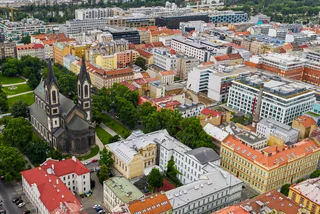Know how much vacation you're entitled to
All full-time employees in the Czech Republic are entitled to a minimum of 4 weeks of paid leave (vacation days) per year. While these days off are mandated by law, many employers offer flexibility regarding time off. It’s crucial to clarify such policies before signing a contract.
During the summer, there are also public holidays (July 6 and 7 and Sept. 28). According to the Labor Code, employees generally don’t have to work. However, there are a few exceptions when the employer may require an employee to perform work that cannot be postponed until working days. Those include urgent repairs, health-care-related work, transportation work, and so on.
Know your rights during hot weather
The Czech Labor Code mandates employers create a safe and healthy work environment meaning that should conditions during a heatwave become unreasonable, employers might ask employees to work from home. Employers must provide regular paid breaks if the workplace temperature reaches 36 degrees Celsius. Physically demanding jobs, such as outdoor construction, require mineral-infused water when temperatures exceed 30 degrees Celsius, while office employees need access to clean tap water.
The maximum permissible temperature for mainly sedentary office work is 27 degrees Celsius. Although air conditioning is not legally required, employers must ensure suitable indoor conditions. Employers must maintain a temperature difference of no more than 6 degrees Celsius between indoor and outdoor environments, provided the outdoor temperature does not exceed 30 degrees Celsius. These regulations also cover self-employed contractors and home-based workers.
Failure to ensure employee safety can result in legal action and compensation claims. Employees can seek financial redress or contact the State Labor Inspection Office if their company does not provide a safe working environment during heatwaves.
Prepare for A/C battles with Czech colleagues
Cultural divides over room temperatures have sparked many office debates in Prague during the current heatwave. In Czech, days over 30 degrees Celsius are called "hic" or "pařák." Czechs find relief from the heat through activities like swimming, forest walks, or enjoying cold drinks at outdoor cafes. Strategies for cooling living spaces often involve carefully timed window management and consuming watermelon, white wine, and Míša bars rather than using air conditioning (klimatizace).
There is a general Czech skepticism toward air conditioning, based on beliefs that chilled environments and behaviors like drinking cold beverages or sleeping in a cooled room can cause health issues. The Ministry of Health supports the cautious use of air conditioning, noting the potential for colds when transitioning between environments with a significant temperature difference.
The debate extends to the office, where British and American employees favor strong cooling, while Czech colleagues view it as potentially harmful. A compromise seems necessary.
To manage your workday, SZÚ advises taking frequent breaks, stretching or propping your feet up, and, if possible, indulging in a siesta during the early afternoon.
Research from the International Journal of Epidemiology indicates that people in air-conditioned buildings may be more prone to illness due to microorganisms in the system, not the cool air itself. Conversely, studies suggest that a cool office can enhance work efficiency, improve sleep, and reduce mortality despite contributing to greenhouse gas emissions.
Officials also advise on how to use air conditioning properly, an ever-divisive topic in workplaces and households across the country. The State Health Institute recently released tips for how to use air conditioning safely. “Set a reasonable temperature, no more than 5 to 7 degrees Celsius lower than the outside temperature. [Being] too cold can cause heat shock, and prolonged exposure may lead to colds.”
Understand cucumber season
During the summer, Czech office life faces a “cucumber season” (Okurková sezona), which traditionally refers to a period of little news in the media but has also grown to encompass the workplace (and could also be known as auto-reply season). This time also sees a slowdown in the economy and government due to parliamentary holidays, while cultural institutions like theaters close down for the season.
Cucumber season spans July through early September, when everyone is out to an extended lunch or on vacation, no matter your profession. Need to get someone on the telephone after 1 p.m. on a Friday? Do you want to plan a Monday morning meeting? Good luck.
Cucumber season is so much a part of summertime in the Czech workplace that a group of Czech illustrators and designers released a series of artful auto-reply responses you can download during your vacation.
However, extended summer vacations seem to be declining: a recent report found that Czech workers take less holiday than they should. Another survey shows that one-third of Czechs disconnect entirely from work while on holiday, avoiding emails and calls, and nearly 60 percent occasionally check work communications.
The study by Platyz.cz found that most Czechs take a two-week vacation (36 percent), followed by one week (23 percent). Additionally, 47 percent take holidays yearly, and 92 percent use most of their vacation days annually.












 Reading time: 4 minutes
Reading time: 4 minutes 






























